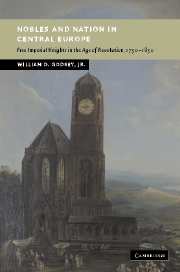Book contents
- Frontmatter
- Contents
- Preface
- Abbreviations
- Introduction
- 1 Wealth and noble autonomy: the Free Imperial Knights in Mainz on the eve of revolution
- 2 Nobles becoming Germans: the transformation of a concept
- 3 Nobles becoming Germans: the destruction of a “geo-cultural landscape”
- 4 Between destruction and survival: knights on the Middle Rhine 1750–1850
- 5 The past recaptured: knights in the Hapsburg Empire 1792–1848
- 6 From cathedral canons to priests: the Coudenhoves and the “Catholic revival”
- 7 The beginnings of conservative German nationalism: the “naturalization” of Baron Carl vom und zum Stein (1757–1831)
- Conclusion
- Appendix: Families of Free Imperial Knights (1797)
- Bibliography
- Index
6 - From cathedral canons to priests: the Coudenhoves and the “Catholic revival”
Published online by Cambridge University Press: 01 October 2009
- Frontmatter
- Contents
- Preface
- Abbreviations
- Introduction
- 1 Wealth and noble autonomy: the Free Imperial Knights in Mainz on the eve of revolution
- 2 Nobles becoming Germans: the transformation of a concept
- 3 Nobles becoming Germans: the destruction of a “geo-cultural landscape”
- 4 Between destruction and survival: knights on the Middle Rhine 1750–1850
- 5 The past recaptured: knights in the Hapsburg Empire 1792–1848
- 6 From cathedral canons to priests: the Coudenhoves and the “Catholic revival”
- 7 The beginnings of conservative German nationalism: the “naturalization” of Baron Carl vom und zum Stein (1757–1831)
- Conclusion
- Appendix: Families of Free Imperial Knights (1797)
- Bibliography
- Index
Summary
“These old lineages almost all had a policy, avowed or tacit, with respect to marriage. The most ambitious took wives, if possible, above their social level, thus facilitating the ascent in the following generation.”
Marguerite Yourcenar, Le Labyrinthe du monde, vol. 1: Souvenirs pieux (Paris, 1974), 120.“The old practice, that an upper class looks for a new, acceptable cultural climate when the old one has been decisively changed, is also confirmed here.”
Hellmuth Rössler, Graf Johann Philipp Stadion. Napoleons deutscher Gegenspieler, 2 vols. (Vienna and Munich: Herold, 1966), I, 174.“The land had not changed … There were still the deep beechwoods making groves beside the ploughlands and the rooks rising lazily as the plough came towards them. The land had not changed … Well, the breed had not changed … There was Christopher … Only, the times … they had changed. The rooks and the ploughlands and the beeches and Christopher were still there…. But not the frame of mind in the day.”
Ford Madox Ford, Parade's End (New York: Penguin, 2001), 762.The search for continuities in times of revolutionary crisis and disintegration or in those of rapid but peaceful social and economic change has been, with good reason, a popular approach to the past since Braudel. The history of the Free Imperial Knights who emigrated to the Austrian Empire would ostensibly recommend this approach as well.
- Type
- Chapter
- Information
- Nobles and Nation in Central EuropeFree Imperial Knights in the Age of Revolution, 1750–1850, pp. 187 - 212Publisher: Cambridge University PressPrint publication year: 2004

